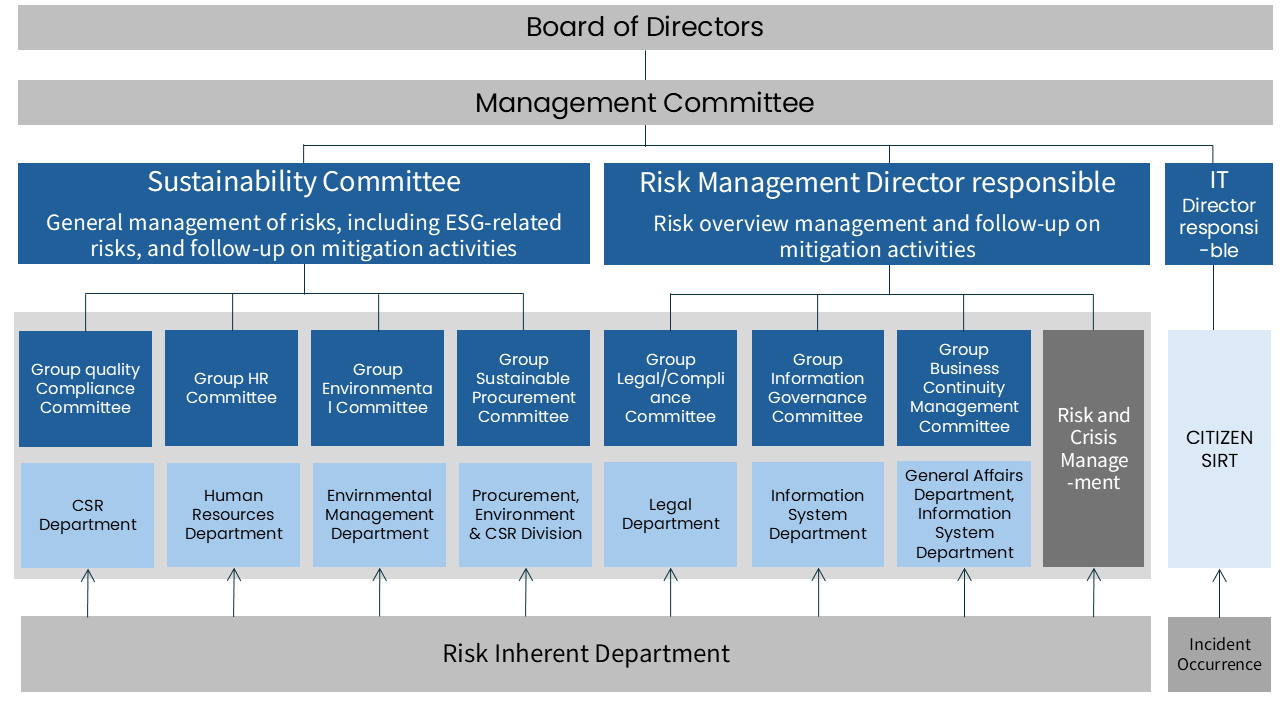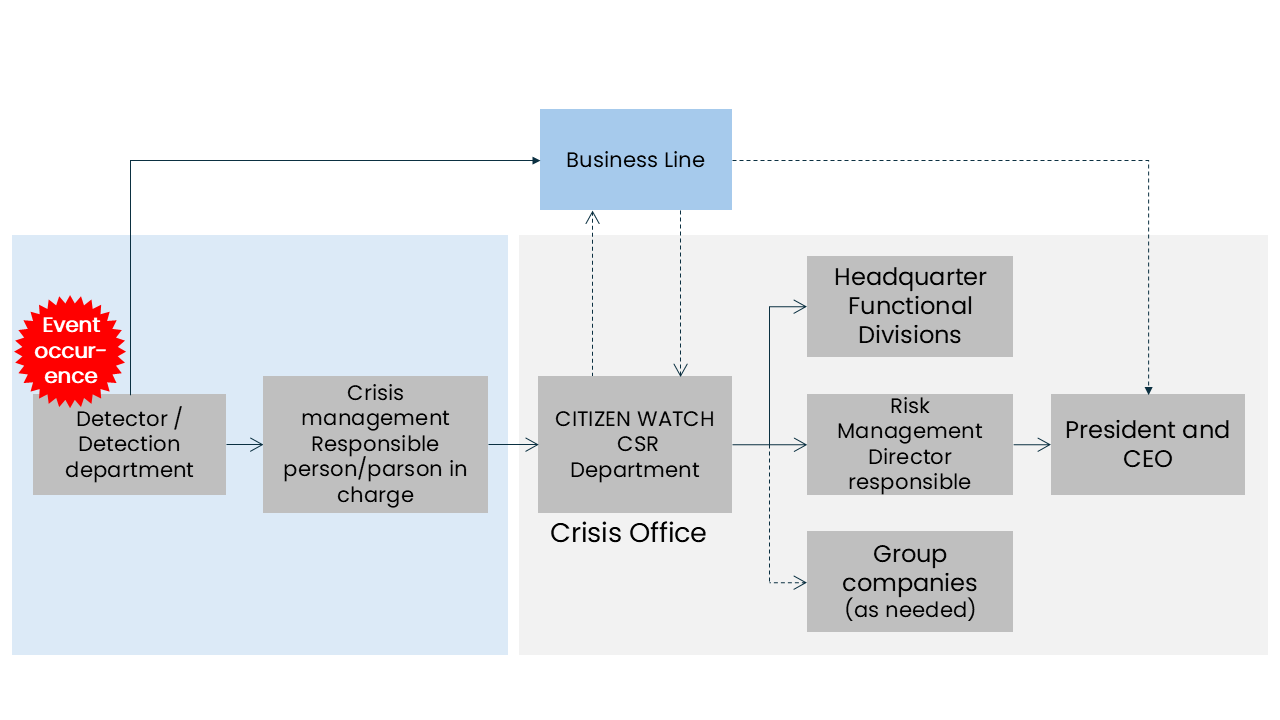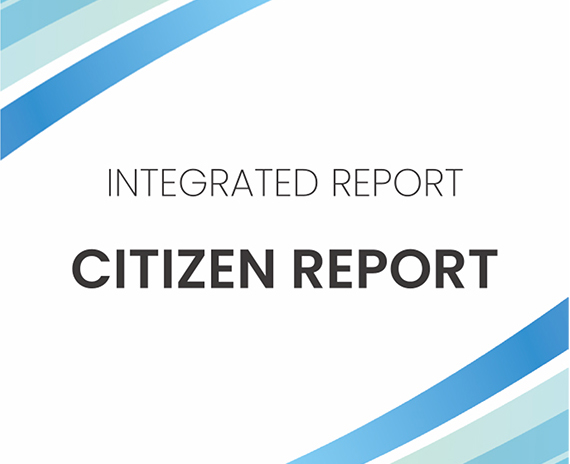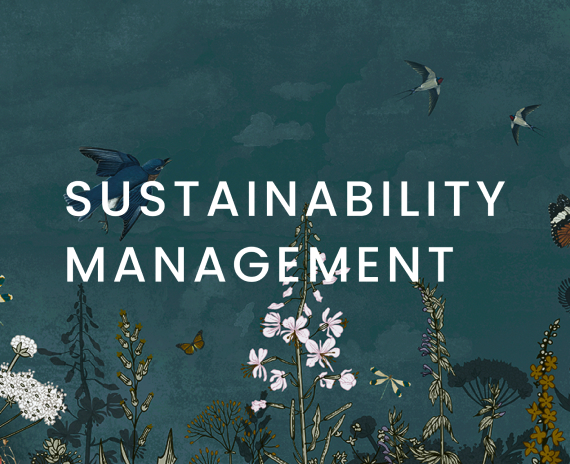- TOP
- Sustainability
- Governance: Strengthening Risk Management
Strengthening Risk Management
Basic Concept for Risk Management
The CITIZEN Group is engaged in activities to identify, analyze, and evaluate risks while appropriately addressing and managing them to ensure the achievement of the Group-wide business targets and sound and sustainable development.
The CITIZEN Group considers risk management as a management concept that combines two processes: risk management to prevent crises from occurring and crisis management to minimize risks when crises do occur.
Group Risk Management
Strengthening Group Risk Management
The CITIZEN Group has established a Group risk and crisis management system in line with the Group Basic Policy on Risk Management, which is aimed at managing risks throughout the Group in a centralized way and promptly addressing them to promote sustainable management and ensure the achievement of the Group-wide business goals and sustainable development. This system includes subcommittees of the Sustainability Committee that address operational risks in normal times and related ESG risks, as well as committees that address legal, compliance, information security, disasters, and other risks.
The CSR Department of CITIZEN WATCH, which plays a central role in the Group risk and crisis management, cooperates with the departments of CITIZEN WATCH and domestic and overseas Group companies to strengthen Group governance, check the progress of quality compliance enhancement measures and the state of significant risks for the Group, and identify and respond to emerging risks.
ESG risks and materiality risks, like other significant risks, must also be addressed to ensure the Group’s sustainable existence. Therefore, the Sustainability Committee has taken the lead in examining the impact of these risks on the Group and countermeasures for them, and the entire Group is working to foster awareness of risks, including risks specific to each Group company. We are also discussing preventive measures and other measures for emerging risks such as cyberattacks, information leaks, and revision to laws and regulations overseas, which could have a significant impact on the Group in the medium term.

Key Initiatives against Significant Risks
We have identified Group Significant Risks, important business-activity-related operational risks that are linked with the material issues and are likely to affect the business of The CITIZEN Group as a whole and society. For FY2025, against the background of changes in the social situation and on external experts’ advice, we have added new risks to the list of the risks we identified, such as geopolitical, natural disaster, and sustainability risks, and have also reviewed the already identified risks.
In addition, we have reclassified the existing 11 risk fields (accounting/finance, information systems, human resources, general affairs, fair trade, safety assurance trade, intellectual property, environment, information management, CSR, and quality) into six new categories: compliance, financial/disclosure, natural capital/environmental, human capital, information/systems, and business continuity risks. These risks are managed by each Group Committee and by CITIZEN WATCH’s CSR Department, which plays a central role in risk and crisis management for the Group, with support from the Management Committee. Moreover, the Sustainability Committee not only serves as a steering committee for sustainability initiatives throughout the Group but also regularly identifies, assesses, and reviews Group Significant Risks, devises countermeasures, and checks the status of risk management.
Furthermore, we ensure that information and knowledge about the Group Significant Risks and Group-company-specific risks, together with know-how for addressing them, are shared among all Group companies to achieve uniform risk management throughout the Group.
| Compliance Risks |
|---|
| Violation of bribery regulations or antitrust laws |
| Violation of import/export related regulations (including security trade controls and U.S. economic sanctions laws) |
| Quality compliance violations |
| Intellectual property rights infringement |
| Violation of the Modern Slavery Act and the California Transparency in Supply Chains Act |
| Financial/Disclosure Risks |
| Errors or fraud in financial disclosure (risk of inappropriate accounting at overseas subsidiaries) |
| Taxation risks due to base erosion and profit shifting (BEPS) or transfer pricing |
| Deficiencies or errors in ESG disclosure |
| Natural Capital/Environmental Risks |
| Leakage or spillage of hazardous substances from plant facilities or violation of environmental laws or regulations |
| Violation of the control of chemical substances contained in products (RoHS, REACH, etc.) |
| Delayed response to climate change |
| Adverse impacts on biodiversity |
| Depletion of water resources |
| Human Capital Risks |
| Violation of safety consideration obligation |
| Delayed diversity, equity, and inclusion (DE&I) measures |
| Risks entailed in securing and developing human resources |
| Information/Systems Risks |
| Software license violations |
| Information leakage due to cyberattacks |
| Suspension of operations due to information system outage |
| Leakage of confidential information, such as personal information or trade secrets |
| Business Continuity Risks |
| • Facility damage or operational suspension due to natural disasters (major earthquakes, tsunamis, etc.) (business continuity management [BCM] risks) |
| Supply chain disruptions due to pandemics |
| Geopolitical risks (of international and civil war and terrorism) |
| Disrupted supply of important raw materials |
| Unstable energy supply |
Actions Taken against Group Risks
Response to Crises
In preparation against major crises (natural disasters, terrorism, incidents/accidents, pandemics, etc.) that could occur in various parts of the world, The CITIZEN Group has constructed a global crisis management system, which allows top management to respond promptly to those crises.
To promptly and appropriately collect, judge, and disclose crisis information, The CITIZEN Group has established a system to minimize the impact on its business and stakeholders in the event of a major incident by clearly defining criteria for reporting to CITIZEN WATCH, holding emergency recognition meetings to judge the importance of the incident, and establishing a crisis response headquarters to consider specific responsive measures.
All crisis information, including information related to health, safety, and occupational accidents, is gathered in CITIZEN WATCH’s Crisis Office and reported to the Bimonthly Reporting Meeting for the President, the Management Committee, and the Board of Directors as appropriate, depending on the severity of risks concerning finance, human damage, or damage to corporate value, etc.
Crisis Report Line
Criteria for notification to Group companies and headquarters functional divisions
- Crisis Levels
-
- IV: Consideration on a case-by-case basis (* serious case involving risks in easy notification)
- III: Notification on the same day as the report is received
- II: Monthly summary notification
- I: No notification required

- * Crisis levels are determined in accordance with the Crisis Level Criteria Table (by event/impact), provided separately.
Overseas Safety Management System
Terrorism, political unrest, natural disasters, pandemics, and other unforeseen events around the world can cause significant damage to employees and companies serving abroad. Regarding the overseas safety management of employees, The CITIZEN Group has a system in place whereby the Overseas Safety Management Office constantly keeps track of the whereabouts of business travelers and expatriates of the Group, including those who travel to multiple countries and regions, confirms their safety in the event of an unexpected incident or accident, and provides appropriate instructions according to the situation. The Office also monitors overseas safety information daily while proactively disseminating information to business travelers and expatriates.
We have also begun to prepare for specific responses to geopolitical risks.
Business Continuity Plan (BCP)
To prepare for the case of a major disaster, pandemic, accident, or other event that has a significant impact on management resources and causes or is expected to cause business suspension or interruption, the CITIZEN Group has formulated Business Continuity Plans (BCPs) that define the systems, roles, and response procedures necessary for business continuity and ensure the continuation of product and service supply or early restoration of operations.
We are working on the maintenance of these established BCPs to deal with issues that become apparent through disaster drills while aiming to increase their effectiveness and sophistication by adapting to changes in risks.
In light of the recently growing risk of cyberattacks, in FY2024, the Group Business Continuity Management Committee invited an external expert to give a lecture to provide employees with the opportunity to learn about the latest trends in business continuity management and practical responses. In addition, the Secretariat of the Group Business Continuity Management Committee took the lead in conducting simulation drills on the supposition of unauthorized access to the core system of CITIZEN WATCH, which is the Group’s main business. Key departments in charge of finance, orders, labor management, etc. participated in the drills. These drills heightened the participants’ awareness of the necessity of reviewing and reorganizing their operations in anticipation of an emergency and preparing for post-emergency recovery. We will continue to conduct this kind of simulation drill to prepare for emergency responses, identify the risk of unforeseen incidents, and deepen employees’ understanding of the BCPs, thereby becoming better capable of continuing our business in any situation, rather than simply recovering from an emergency.
Trade Secret Management
At The CITIZEN Group, to protect trade secrets, which are information crucial to business activities, the Group Information Governance Committee promotes management and operations concerning trade secrets and works while sharing information and addressing issues. The Committee also provides officers and employees with training to ensure that they are all fully aware of the importance of trade secret management. In FY2024, just as in previous years, the Committee had meetings and offered e-learning courses on trade secrets to employees of the Group companies in Japan. These activities will be continued in subsequent years.
In addition, CITIZEN WATCH receives annual reports on trade secrets from each department within the Company, and internal audits based on the reports are conducted to correct the situation as appropriate. In FY2024, there were no events falling under the category of serious incidents.








